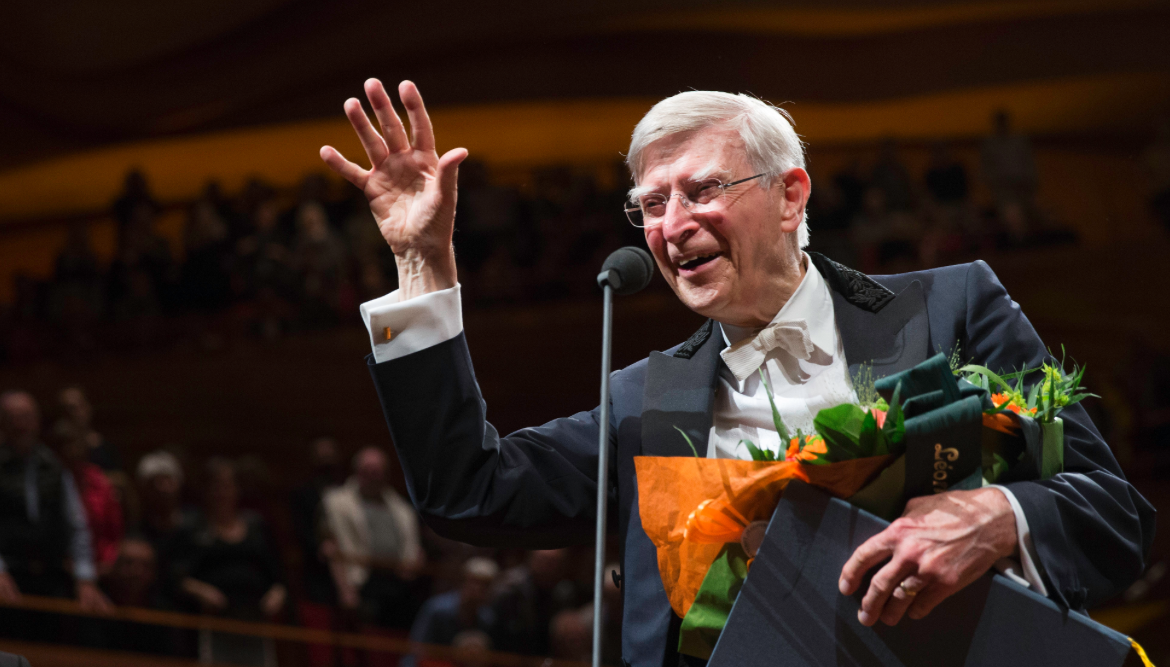léonie sonning music prize 1978
The French flautist Jean-Pierre Rampal received the Léonie Sonning Music Prize of 100,000 Danish kroner at a concert on 24 April 1978 at the Falconer Centre. The concert was broadcast live by the Danish Broadcasting Corporation’s P1 radio channel.The prize was presented by Professor Poul Birkelund, a member of the Léonie Sonning Music Foundation’s board. In his prize speech, he included the following comments:
‘We may consider Paul Taffanel, Philippe Gaubert and Marcel Moyse the masters of the French flute tradition. You, Jean-Pierre Rampal, the master flautist of our time, have claimed this tradition for yourself in the most beautiful way. Not only have you put audiences on five continents at your feet with your golden flute, you have also, as the most tenacious performer of our time, gilded the works of an enormous number of contemporary composers with your noble musical mind and with an incredible sense of beauty and imagination.’
citation
The Léonie Sonning Music Prize of 100,000 Danish kroner is hereby awarded to Jean-Pierre Rampal in deep admiration for the utterly beautiful and imaginative interpretations of flute works from all periods, including numerous contemporary works composed for him, one of the most significant flautists of our time.’
The programme
W.A. Mozart Overture to Il Re Pastore
Flute Concerto
Erik Norby Illuminations. Capriccio for flute and orchestra. First performance.
J. S. Bach Suite no. 2 in B minor for flute, strings and harpsichord
Sarabande (encore)
Rampal and Denmark
In connection with the prize concert, Rampal gave three more concerts in Denmark. On 28 April he played at the Glyptotek in Copenhagen with the flautist Michel Debost and the Royal Danish Academy of Music’s Chamber Orchestra, conducted by Milan Vitek. The program consisted of Bach’s Brandenburg Concerto No 4, Cimarosa’s Concerto for Two Flutes, André Jolivet’s Flute Concerto and a Concerto Grosso by Handel. The next day the entire program was repeated at Egeskov Castle.
Politiken’s reviewer Fleming Weis wrote about the concert: ‘it was another sign of perfect clarity that Rampal let his flute signal when, in the generous acknowledgment of overwhelming applause from the crowded Glyptotek, he would play the Dance of the Blessed Spirits from Gluck’s ballet music for Orpheus. There was a mood of enthusiasm throughout the evening that had the audience in its firm grip. Can a melodic line even be played with such beauty of timbre and expression? It seemed unthinkable.’
On 30 April, Rampal played again at the Glyptotek, this time in chamber music by Holmboe, Paisiello, Telemann, Ibert, Honegger, Debussy, Doppler and Boismortier together with the Poul Birkelund Quartet, the pianist Eyvind Møller and the Kuhlau Quartet. Also during his stay in Copenhagen, Rampal recorded Erik Norby’s new work Illuminations, which was premiered at the prize concert, as well as recording Carl Nielsen’s Flute Concerto with the Zealand Symphony Orchestra conducted by John Frandsen. The recording was supported by the Léonie Sonning Music Foundation and was released in 1979 on the French label Erato.
The daily press wrote, among other things:
Jean-Pierre Rampal is among the select few that can both survive their fame and live up to it. His personal charisma alone could have persuaded the jury to award him the Sonning Prize. It is sometimes easier to describe what is wrong with a performance than what is right with it. But in my opinion, the highlight of the evening was the encore in which Rampal, alone with his flute in front of thousands of spectators, acknowledged the applause and with the simple note with which Bach draws the shape of a Sarabande, gave us that magical experience in art – making time stand still. […]. A highlight of the concert was the Danish premiere of a new work by Erik Norby, dedicated to and written for Rampal who was, of course, a fantastic soloist who at the same time was modest enough not to overplay his role, but just to shade, and cast new light on the orchestra’s statements. It was a pleasure to hear that piece.
(Jurij Moskvitin, Politiken, 26 April 1978)





